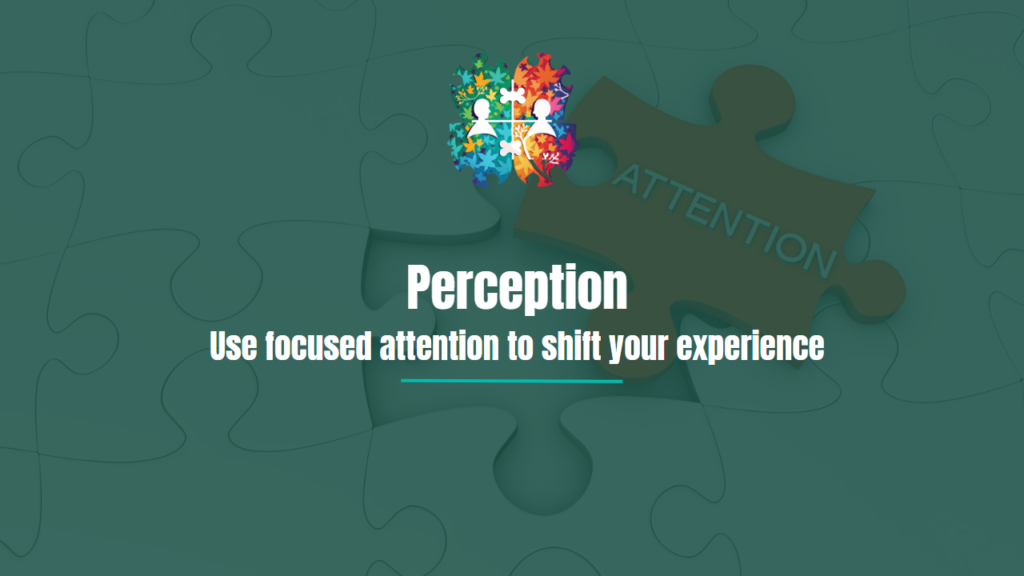PETER 25 APRIL 2023 7 MIN READ

Why is it that one person experiences the world around them completely differently than another? We’ve discussed part of the answer in the post “Beliefs Determine Your Perception of the World – The Power of the Self-Fulfilling Prophecy and Confirmation Bias.” Another important aspect is where we focus our attention. In this article, we’ll discuss the importance of attention and how it can positively or negatively impact your life.
The effect of attention
Tony Robbins’ experiment
One of the most fascinating experiments on attention comes from Tony Robbins, a famous life coach and motivational speaker. In his audio course Personal Power II, he asks the listener to do the following:
- Look around the room you’re in. Find everything that’s brown. Which objects are brown? What’s in the room that’s brown? Look closely!
- Then close your eyes and name as many things as you can that are… green.
- Feel a bit tricked? Give it a try. Chances are you can’t recall many green things.
- Can’t think of any more? Open your eyes and look. Search for everything green.
You’ll notice there’s a lot more green in your surroundings than you initially thought. Was it there before? Absolutely. So why couldn’t you remember it with your eyes closed? The answer is focus – or attention. You were primed to direct your attention elsewhere. Since the focus was initially on brown, it was difficult to remember the green objects.
The importance of focus
The Secret
This experiment demonstrates how important focus is in our daily lives: sometimes we don’t see beautiful things because we’re focused on something else.
The famous movie ‘The Secret’ by Rhonda Byrne illustrates this as well. The film is controversial, and I don’t endorse everything claimed there. But I do believe that I experience more of what I focus on. If I start my day with gratitude exercises – making a list of things I’m grateful for – it seems like I notice more things to be grateful for that day.
In The Secret, this is explained by the Law of Attraction: our thoughts and feelings determine what we attract into our lives. Positive thoughts attract positive things, negative thoughts attract negative things.
Examples
True or not, think about the following two scenarios where the situation changes by directing your attention differently to the same “task.” Your feelings about the situation change, and as a result, the outcome often changes:
- Walking a line or beam
Can you walk along a 4-meter-long, 10-cm-wide line painted on the ground? Probably no problem at all. Can you do the same on a 4-meter-long, 10 cm-wide beam, 3 meters above the ground? It likely becomes much harder. Why? - A soccer game
I’ve always played soccer. Once, we were leading 3-0 at halftime. Easy and confident. The opponent wasn’t doing well. Then suddenly, out of nowhere, it became 1-3 and everything fell apart. How did that happen?
In both situations, the same thing happens: focus shifts. Initially, you concentrated on accomplishing tasks like walking the line or playing soccer to win. But then the situation changes. Suddenly, you’re not just thinking about walking the line or beam but preventing a fall! Suddenly, you’re just trying to avoid losing! You’re attracting the negative, so to speak.
Reflect on similar situations you’ve experienced. Ever had a time when everything was going smoothly and working out? Or when everything was going against you during a difficult period?

An explanation: the Reticular Activating System (RAS) in your brain
The Reticular Activating System (RAS) is a network of neurons in the brain. It plays a crucial role in filtering information and directing attention. The RAS helps us be selective in what we perceive and process, so we can focus on relevant information and ignore the rest.
The functioning can be illustrated with the following examples:
- New mothers
New mothers often wake up to the softest sound of their baby, even when they are in deep sleep. This is because the RAS considers these sounds very relevant and immediately alerts the mother. - Cocktail party effect
At a party, we can focus our attention on a single conversation. We ignore what is being said by a group behind us. But if someone in that other group mentions our name, we’re likely to hear it. Our name is important to our RAS. - Baader-Meinhof phenomenon
When you buy a new car, it seems like that car is everywhere. And when you (or your partner) are pregnant, everyone around you also seems to be expecting. This happens because we unconsciously focus on what is important and notice it among everything around us.
The RAS is essential to our cognitive functioning. It influences how we experience the world around us. By being aware of the workings of the RAS, we can learn to direct our attention better. We can focus on what is truly important in our lives.
What can we do to focus our attention?
- Setting goals
Knowing what you want to achieve is important. Goals give you focus and help you direct your energy toward what matters. The clearer this is for you, the stronger the effect will be. Opportunities will emerge from the background. - Determine your values
Values act as a compass. They help you make decisions that align with who you truly want to be. - Asking the right questions
Tony Robbins says, “Questions are the answer!” Asking the right questions can help you focus your attention on positive and productive matters. Pay attention to the following tips:- Ask yourself positive questions: Questions without negatives, as our brain ignores these.
- Avoid questions with negative assumptions, such as “Why does this always happen to me?” This type of question leads to negative answers and reinforces unwanted beliefs.
- Use assumptions to our advantage, for example by asking: “Why am I always lucky?”
- Train your attention with mindfulness and meditation
- Mindfulness is the conscious directing of your attention to the present moment, without judgment. Regular practice can improve your concentration. You can reduce stress and build emotional resilience.
- Meditation is a related practice in which you train your attention by focusing on an anchor: your breath, a mantra,… Do you notice your attention drifting away from your breath or mantra? Simply return and refocus. It may seem straightforward but it’s not. Many people get frustrated when they drift off. Actually, that’s a good thing. Noticing and bringing your attention back is the exercise itself. It’s like putting a puppy that keeps running away back in the same place until it doesn’t run away anymore… The same goes for your mind.
In a later blog post, I’ll dig deeper into this topic.

Conclusion
Attention is a very important factor, alongside our beliefs. Together, they largely determine how we experience the world around us. Training your attention and awareness is essential for a healthy mind and personal growth. By focusing on what is important, setting goals, determining your values, and increasing your awareness, you can create a life that aligns with your deepest desires and beliefs. Start practicing mindfulness and meditation today and discover the power of focused attention for yourself.
Want to read more?
- Robbins, A. (1991). Personal Power II: The Driving Force! Robbins Research International.
- Robbins, A. (1991). Awaken the Giant Within: How to Take Immediate Control of Your Mental, Emotional, Physical and Financial Life.
- Byrne, R. (2006). The Secret.
- Dweck, C. S. (2006). Mindset: The New Psychology of Success. Ballantine Books
- Kabat-Zinn, J. (1994). Wherever You Go, There You Are: Mindfulness Meditation in Everyday Life. Hachette Books
- Baumeister, R. F., & Tierney, J. (2011). Willpower: Rediscovering the Greatest Human Strength. Penguin Books
- Posner, M. I., & Petersen, S. E. (1990). The attention system of the human brain. Annual Review of Neuroscience, 13, 25-42
On this blog, I promote books that I consider valuable. As an Amazon Associate, I earn from qualifying purchases to support this blog.







